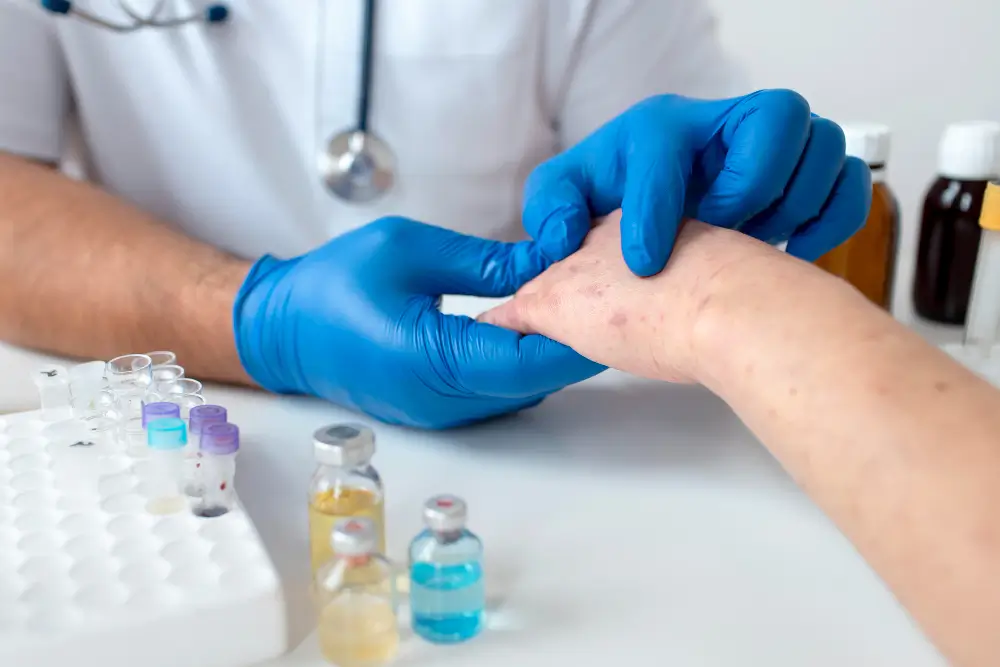You’ve been dealing with unexplained sneezing, itchy eyes, or skin reactions, and now it’s time to get answers. But before scheduling an allergy test, one big question arises: how much will it cost? The price isn’t always straightforward, as factors like test type, location, and insurance play a role. This article breaks down the costs of allergy testing and what you can expect to pay.
Allergy relief starts here—Schedule a consultation with an allergist in the Bronx! 🩺

What Affects the Cost of Allergy Testing?
The cost of allergy testing varies based on the type of test, location, and insurance coverage. Knowing these factors helps plan a budget and avoid unexpected expenses.
Prices for allergy tests generally fall within the following range:
| Type of Test | Estimated Cost |
| Skin Prick Test | $100 – $300 |
| Blood Test (IgE Test) | $200 – $500 |
Insurance may cover part or all of these costs, depending on the plan. Medicare Part B covers 80% of medically necessary allergy tests, leaving a 20% copay, which a supplemental plan may cover. Some tests require prior authorization or have quantity limits.
To avoid surprises, check with your insurance provider to confirm coverage and whether prior authorization is needed. Discussing options with your doctor helps ensure the test is medically necessary, maximizing insurance benefits.
How Much Do Different Allergy Tests Cost?
The cost of allergy tests depends on the type of test used, the number of allergens tested, and where the test is performed.
Skin tests are generally more affordable than blood tests, which require advanced technology. Costs increase when testing for more allergens, as some tests only check for the most common triggers, while others evaluate a wider range of substances.
Location also affects pricing. Hospitals and specialized clinics often charge more than independent labs, though insurance or discounts may reduce costs.
Skin Prick Test
This common method detects allergies to substances like pollen, dust, pet dander, and mold. Small amounts of allergens are applied to the skin through light pricks to observe reactions.
Estimated cost: $100 – $300, depending on the number of allergens tested.
Allergy Blood Test
This test measures the level of IgE antibodies in the blood in response to specific allergens. It is useful when skin tests are not an option or when more detailed results are needed.
Estimated cost: $100 – $500, depending on the specific test.
At-Home Allergy Test
Some labs offer at-home allergy testing kits. These usually involve collecting a blood sample and sending it to a lab for analysis.
Estimated cost varies depending on the kit and lab processing fees.
Knowing these cost factors can help you make an informed decision about allergy testing and avoid unexpected expenses.
Finding an Affordable Allergist Near You
Finding an affordable allergist is key to receiving proper care without straining your budget. Consider the following strategies when searching for an allergist that meets your needs:
Check Your Insurance Coverage
Before scheduling an allergy test, verify which specialists are covered by your insurance plan. Choosing an in-network provider can significantly lower consultation and testing costs.
Look for Internal Medicine Clinics Offering Allergy Services
Some internal medicine clinics provide allergy evaluation and treatment. These clinics may offer specialized care without requiring multiple referrals, making diagnosis more efficient and reducing additional costs.
Consider Clinics with Preventive Care Services
Certain clinics offer early allergy detection as part of broader preventive health services. Identifying allergies before they become severe can allow for timely treatment and help avoid higher expenses later.
Compare Prices Among Specialists
Before selecting an allergist, research multiple options and request price estimates. Costs can vary significantly between clinics and labs, so comparing in advance can help you find an affordable option without sacrificing quality care.
Planning and researching options can help you find quality allergy care while keeping costs manageable.
Are Allergy Tests Worth It?
Allergy tests can help identify the triggers of your symptoms. Before deciding to get tested, weigh the costs and benefits.
Common allergens include pollen, pet dander, dust mites, certain foods, and mold. Identifying them allows for better prevention and treatment, including antihistamines or immunotherapy. In individuals with asthma or respiratory conditions, early detection of allergies can help prevent serious complications.
Allergy tests are generally safe, though minor side effects like itching or irritation may occur with skin tests, and mild discomfort may follow blood tests. Oral food challenges carry a risk of severe reactions and should always be performed under medical supervision.
These tests can help diagnose and manage allergies, allowing you to avoid triggers and improve your quality of life. Consulting a specialist can determine if testing is necessary and clarify any potential risks or benefits.
Learn More About Allergy Testing & Treatment
Allergy test results help specialists recommend effective strategies, including allergen avoidance or medications like antihistamines, decongestants, and corticosteroids.
Beyond symptom management, long-term treatments can reduce sensitivity to allergens or even build tolerance over time. Genetic predisposition, environment, and lifestyle all influence the development and progression of allergies.
For more information on allergy testing and treatment, consult an allergist or explore reliable educational resources. Many guides and articles can help you make informed decisions about your health. Speaking with a doctor is the first step in finding the right treatment and improving your well-being.
Sources:
- Kwong, K. Y., & Lu, Y. Z. (2023). Cost of serum versus skin allergy testing among Medicare fee-for-service beneficiaries in the United States. Journal of Health Economics and Outcomes Research, 10(2), 14.
- Mattingly II, T. J., Fulton, A., Lumish, R. A., Williams, A. M., Yoon, S., Yuen, M., & Heil, E. L. (2018). The cost of self-reported penicillin allergy: a systematic review. The Journal of Allergy and Clinical Immunology: In Practice, 6(5), 1649-1654.
